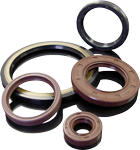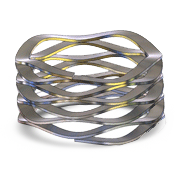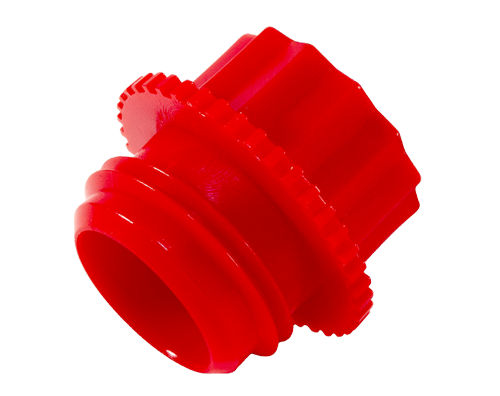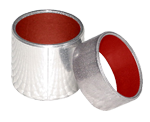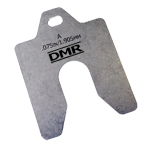Home >> Seal >> Trelleborg Sealing Solution >> Turcon® Variseal® >> Seal Materials
Seal Materials
Turcon® Seal Materials
Turcon ® materials are high performance thermoplastics specifically developed for sealing applications. They are based on premium-grade PTFE fluoropolymer resins, with the properties of each compound achieved by the addition of fillers and special processing techniques.
Turcon ® materials offer the following benefits:
Low Coefficient of Friction
Friction is dependent on pressure, contact surface area, speed and lubrication. Turcon ® materials have very good friction characteristics. For example, a coefficient of friction on steel mating surfaces of 0.04 can be achieved under lubricated and hydrodynamic conditions.
Turcon ® materials do not adhere to their mating surfaces and show only a slight difference between static and dynamic friction, thus eliminating the danger of the stick-slip effect in dynamic applications.
Chemical Compatibility
Turcon ® materials are stable in all hydraulic fluids. Seal materials should be chosen to suit the lubricating properties of hydraulic media and the wear properties of seal and mating surfaces.
There is only a slight change in the chemical properties of Turcon ® materials, compared to chemically inert virgin PTFE, dependent on the type of filler material added.
Temperature Range
Turcon ® materials can be used at temperatures between -253 °C and +300 °C (-423 °F and +572 °F). The limits for low temperatures are dependent on seal design and the thermal contraction of the material. Special designs are available for sealing cryogenic fluids at temperatures below -200 °C (-328 °F).
General service temperature is limited to +300 °C (+572 °F). At temperatures above this, the seal materials begin to lose their strength and are subject to plastic deformation.
For temperatures above +260 °C (+500 °F), please reference the Plastics Industry Association Safe Handling Guide.
Temperature Cycling
Cyclical temperature fluctuations do not change the properties of Turcon ® materials.
High Surface Speeds
The mechanical properties of Turcon ® materials mean they are excellent in dynamic applications, even under extreme loads.
Turcon ® seals offer higher operational reliability than elastomer seals in dynamic situations, especially in dry starting or operating conditions, as they do not suffer from adhesion or heat generation. When the application is lubricated, seal life will be extended further.
Wear Resistance
Wear resistance is dependent upon material fillers which influence the Turcon ® material‘s mechanical and physical properties. Fillers in Turcon ® include graphite, carbon, carbon fiber, glass fiber, molybdenum disulphide and other polymers. They can give increased resilience, improved wear resistance, reduced thermal expansion and extremely high resistance to abrasive wear.
Aging
Turcon ® materials remain unchanged over extended periods. They are practically non-aging and do not become brittle or degrade, even when subject to severe weathering from heat, light, water or salt spray.
Radiation
Turcon ® materials exhibit a low resistance to electron and gamma radiation and are not recommended for use in applications where the accumulated radiation doses exceed 7 x 102 Gy (7 x 104 rad). For applications, subject to high radiation doses, special fluoropolymers such as ETFE and PCTFE or Zurcon ® materials should be selected.
Other Properties
Some Turcon ® materials have outstanding electrical properties, such as a low dielectric constant or a very high electric strength, even at elevated temperatures.
Physiologically safe Turcon ® materials are available which meet the requirements of the German Federal Health Authority (BGA) and the FDA Regulation (Food and Drug Administration) No. 21 CFR, Part 177.
The water absorption of Turcon ® materials is < 0.01%.
Zurcon ® Seal Materials
ZURCON ® Z80
Zurcon ® Z80 is a virgin Ultra High Molecular Weight Polyethylene, or UHMWPE. Because the water absorption of Zurcon ® Z80 is zero, it is ideal for water service. Its abrasion resistance is five to ten times higher than PTFE, making it the material of choice in abrasive environments. As it is physiologically safe, it is also suitable for use in food and pharmaceutical processing.
The main characteristics of Zurcon ® Z80 are:
Low Friction
The dry friction coefficient of Zurcon ® Z80 is lower than most other materials though higher than many filled PTFE materials. Zurcon ® Z80 forms a self-lubricating, non-stick surface.
Chemical Compatibility
Zurcon ® Z80 is stable in all hydraulic fluids. It has a high resistance to acids, bases and aggressive media. The material has limited resistance to aromatic and halogenated hydrocarbons.
Water Service
Zurcon ® Z80 is water repellent and does not swell in water. Its self-lubricating properties in water-based media are excellent, giving it significant advantage over many other materials including PTFE-based ones. This combined with its high strength and wear resistance means it has a long service life in aqueous solutions.
Temperature Range
Zurcon ® Z80 has a maximum continuous operating temperature of +80 °C (+176 °F). Above this temperature its wear resistance and strength begins to decrease. In low-pressure applications it can be used at temperatures of +120 °C (+248 °F) for short periods and can be sterilized briefly at even higher temperatures. Its lowest operating temperature is -200 °C (-328 °F).
Wear Resistance
The abrasive wear resistance of Zurcon ® Z80 is 5 to 10 times higher than that of PTFE based materials. It is therefore recommended in applications where seals are in contact with abrasive media such as paints, adhesives, salts and sludges.
Zurcon ® Z80 is also highly resistant to extrusion at high pressures.
Radiation Resistance
The radiation resistance of Zurcon ® Z80 is significantly higher than that of PTFE-based materials, maintaining good mechanical properties at radiation dosages of up to 100 kGy.
ZURCON® Z48 (TPE)
Thermoplastic elastomer (TPE) materials combine several of the most desirable features of high performance elastomers and flexible plastics. They have exceptional toughness and resilience, with high resistance to creep, impact and fatigue. The premium grades used in the Variseal ® are fully machinable as well as injection moldable and have the following notable properties:
Sealing Ability
TPE conforms well to mating surfaces and, when energized by a spring load, has very good resilience, making it an excellent sealing material with very low leakage rates.
Friction
The coefficient of friction of a typical TPE material ranges from 0.30 to 0.60, depending on the mating surface finish and other service conditions. It is not normally recommended for dry service except at very slow speeds due to concerns about heat generation leading to material degradation.
In lubricated service conditions the speed rating is greatly increased and TPE materials may then be considered for use in moderate to high-speed reciprocating applications, or in slow to moderate-speed rotary service.
Wear and Extrusion Resistance
TPE blends have excellent wear resistance in well-lubricated service where heat generation is kept to a minimum. It is especially long-lasting in low to moderate speeds in reciprocating service at low or high pressures. TPE is also noted for its excellent extrusion resistance in high-pressure applications up to 68.9 MPa (10,000 psi).
Temperature Range
TPE materials exhibit excellent physical properties over a broad temperature range. Various grades are flexible to -62 °C (-80 °F), and retain good physical properties at temperatures to +135 °C (+275 °F). At temperatures above +135 °C (+275 °F), however, TPE is only recommended in short term service because it is subject to heat aging and embrittlement.
Compatibility
Thermoplastic elastomers resist deterioration from many industrial chemicals, oils and solvents. They are resistant to swelling in oils and aliphatic and aromatic hydrocarbons at moderate temperatures. TPE is limited in its compatibility with hot water applications. For example, in long-term service sealing water at +71 °C (+160 °F), TPE loses much of its resilience and experiences a significant drop in tensile strength.


